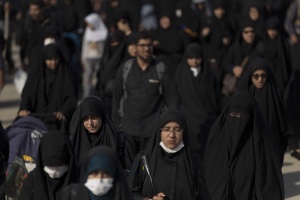
New Delhi: The All India Bar Association (AIBA) has asked the Government to prohibit Muslim women to wear hijab and niqab in secular schools in order to uphold secular values in India. In a letter to Prime Minister Narendra Modi today, it asked the government to ensure that students wear uniform in “secular schools”.

In a letter to the Prime Minister, the AIBA chairman Dr. Adish C. Aggarwala wrote that the AIBA was ” constrained to make this representation after having witnessed that many anti social elements are trying to spoil secular values in educational institutions by mis-guiding the Muslim students to wear Niqab, Hijab, Burqa etc in place of prescribed secular dress code of the educational institutions”.
Referring to India being a secular country and that secularism forms a part of the basic structure of our Constitution, the AIBA pointed out that in the Apex Court decision, in the matter titled S.R. Bommai v. Union of India, the Hon‟ble Supreme Court of India had held that :
“When the State allows citizens to practise and profess their religions, it does not either explicitly or implicitly allow them to introduce religion into non-religious and secular activities of the State.”
That “freedom and tolerance of religion of religion is only to the extent of permitting pursuit of spiritual life which is different from secular life.”
Also read: Hijab row has nothing to do with religion, but everything to do with politics
The Constitution of India under the sub-heading “Right to Religious Freedoms” of Part-III namely “Fundamental Rights” grants religious freedoms guaranteeing the scared rights to religious organizations to run their educational institutions. In such religious educational institutions, they are empowered to run these religious educational institutions as per the tenets of their religion. The management of Madarsas, therefore can prescribe any religious dress code for the students, including Hijab and Niqab.
In India, Madrasas, educational religious institutions for Muslims, provide Munshi and Maulvi (Secondary education), Alim (Senior Secondary education), and further higher education of Kamil and Fazil (Graduation). The Madrasas permit students to wear Niqab, Hijab, Burqa etc. The Governments till date have not interfered in this matter. These educational qualifications provided by Madrasas stand recognised by University Grants Commission, Union Public Service Commission and Government of India and all State Governments in matters of employment etc.
In this context, it is important to note, that having brought about religious reform, even in Muslim majority countries such as Chad, Congo, Cameroon, Guinea, Kosovo, Azerbaijan and Tunisia, the “Niqab” (the full Islamic veil that reveals only a woman‟s eye) in educational institutions have been banned. Even Islamic nations like Egypt and Syria have banned “Niqab” in educational institutions.
European countries like Austria, Belgium Bulgaria, Denmark, France, Italy, The Netherlands and Switzerland have banned full face veils, Burka and “Hijab” in order to uphold secular values.
“The present situation in some areas of Karnataka is the result of misinformation that the Muslim students are entitled to wear Hijab in all educational institutions, as per Muslim religious scripts. Students who were agitating in Karnataka were wearing “Niqabs” in a non-religious institute. As a matter of fact, all educational institutions are not religious institutions. Niqab and Hijab are permitted in Muslim Madarsas and not in general secular educational institutions,” the AIBA letter said. It added: “The country is passing through a critical time where anti- social elements are trying to sabotage the secular fabric of the country. Especially during this time, nobody should be permitted to use Hijab or Niqab in the educational institutions in India and educational institution‟s uniform should be strictly adhered to by the students of secular institutions. The citizens of India are entitled to have the right to follow their religious practices in their religious places and not in the secular places where a dress code is prescribed.”
The AIBA appealed to the leaders of various religious organisations and their student wings, to exercise calm and restraint in these matters, without resorting to provocative statements, slogans or violent behaviour. These are matters which must be resolved by legally permissible methods.
“In these circumstances, we call upon the Central Government and State Governments to ensure that all students, irrespective of any religion, wear the school uniform, in order to uphold secular values in India as India is a secular country,” Dr. Adish C Aggarwala, Senior Advocate Chairman, All India Bar Association, said.
– global bihari bureau





